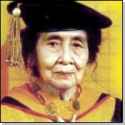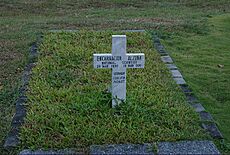Encarnación Alzona facts for kids
Quick facts for kids
Encarnación Alzona
|
|
|---|---|
 |
|
| Born |
Encarnación Alzona y Amoranto
March 23, 1895 |
| Died | March 13, 2001 (aged 105) |
| Nationality | Filipino |
| Alma mater | University of the Philippines Manila (BA, MA) Radcliffe College, Harvard University (MA) Columbia University (Ph.D.) |
| Occupation | Historian, academic, suffragist |
| Known for | National Scientist of the Philippines |
Encarnación Amoranto Alzona was a pioneering Filipino historian, teacher, and a strong supporter of women's rights. She was born on March 23, 1895, and passed away on March 13, 2001. She made history as the first Filipino woman to earn a Ph.D. degree. In 1985, she was given the special title of National Scientist of the Philippines. This award recognized her amazing contributions to the country.
Contents
Early Life and Education
Encarnación Alzona was born in Biñan, Laguna. She grew up in the province of Tayabas. Her father was a judge and a distant relative of the national hero, Jose Rizal. Both her parents loved to read. This helped her develop a strong interest in learning.
She earned a degree in history from the University of the Philippines in Manila in 1917. The next year, she received her master's degree from the same university. Her master's paper was about the history of school education for women in the Philippines. This topic was perfect for her later work as a champion for women's voting rights.
Alzona continued her studies in the United States. She was a pensionado, which meant the American government paid for her education. In 1920, she earned another master's degree in history from Radcliffe College, Harvard University. Then, in 1923, she received her Ph.D. from Columbia University. This made her the very first Filipino woman to get a Ph.D.
After finishing her studies, Alzona returned to the Philippines in 1923. She joined the history department at the University of the Philippines in Manila. This campus later moved to University of the Philippines Diliman.
Fighting for Women's Right to Vote
In 1920, women in America won the right to vote. However, women in the Philippines, which was an American colony at the time, did not have this right. As early as 1919, Alzona wrote an article in the Philippine Review supporting voting rights for Filipino women. In 1926, she wrote a newspaper article expressing her disappointment. She noted that the Philippine legislature was slow to consider laws for women's suffrage.
In 1928, Alzona became the President of the Philippine Association of University Women. This group eventually focused on starting a movement to give women the right to vote. Alzona also wrote a book in 1934 called The Filipino Woman: Her Social, Economic and Political Status (1565–1933). In her book, she argued that Filipino women were clearly equal to men. She pointed out that they deserved more social and political rights. Alzona's writings helped build support for women's suffrage. Finally, in 1937, Filipino women were granted the right to vote.
A Respected Historian
From her position at the university, Alzona wrote several books about Philippine history. Her first book, published in 1932, was titled A History of Education in the Philippines 1565–1930. People praised it as a detailed account of the country's education and culture. They called it "probably the most complete and comprehensive work on the subject to date."
Alzona also wrote biographies about important Filipino women. These included Paz Guazon and Librada Avelino. She also translated historical works by Jose Rizal and Graciano Lopez Jaena. She wrote a historical book in Spanish language called El Llegado de España a Filipinas. For this book, she won the Lone Prize from the Il Congreso de Hispanistas de Filipinas in 1954.
Alzona left the University of the Philippines faculty in 1945. However, she was named a U.P. professor emeritus of history in 1963. In 1955, she helped start the Philippine Historical Association. Other famous historians like Teodoro Agoncillo and Gregorio Zaide were also involved. From 1959 to 1966, Alzona led the National Historical Institute (which was then called the National Historical Commission).
Alzona worked hard to promote the works and legacy of Jose Rizal, her distant relative. She translated his writings and often gave talks about him. She also served as the first president of the Kababaihang Rizal, a women's organization dedicated to Rizal.
A Public Figure and National Scientist
Alzona chose to stay in Manila during the Japanese Occupation in World War II. She even joined the guerrilla movement that fought against the Japanese.
After the war, President Manuel Roxas appointed Alzona to the Philippine delegation for UNESCO. She served in this role until 1949. In 1946, she was chosen to lead the Sub-Committee on Social Science, Philosophy and the Humanities. From 1959 to 1966, Alzona was a member of the Board of Regents of the University of the Philippines.
On July 12, 1985, then President Ferdinand Marcos named Alzona a National Scientist of the Philippines. This was a huge honor for her contributions.
Encarnación Alzona was one of the few Filipinos who lived to be over 100 years old. She passed away on March 13, 2001, just 10 days before her 106th birthday. She is buried at the Libingan ng mga Bayani, a special cemetery for heroes.
 | Calvin Brent |
 | Walter T. Bailey |
 | Martha Cassell Thompson |
 | Alberta Jeannette Cassell |


